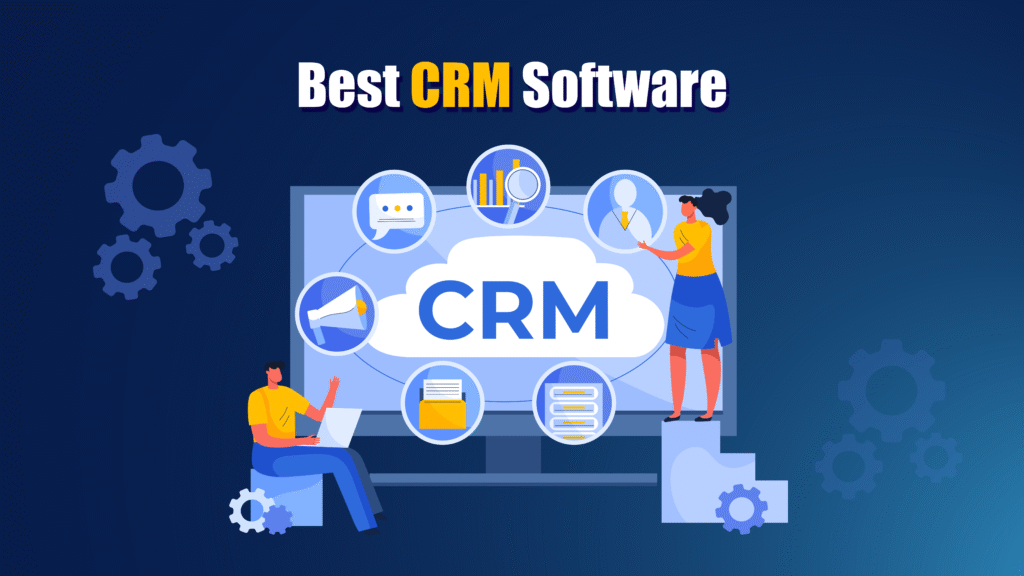Compare the Best CRM Software of 2026
Looking to install a CRM software? Use the form below to compare top CRM options and find the one that fits your business needs. Get a free quote instantly and make the right choice!
What is CRM Software?
Customer Relationship Management (CRM) software refers to a tool that helps businesses manage interactions with current and potential customers. It consolidates customer data, streamlines communication, and enhances business processes, improving customer relationships, sales, and marketing efforts. Sales teams use CRM software, customer service departments, and marketing teams to track all customer interactions, provide insights into customer behavior, and automate many administrative tasks.
Why is there a Need for CRM Software?
The need for CRM software arises from the increasing complexity of customer relationships and business processes. Without a CRM, businesses might struggle with scattered customer data, inconsistent communication, and inefficient workflows. Here’s why CRM software is essential:
- Centralized Data: CRM software stores all customer interactions, transactions, and data in one centralized location, making it easy for teams to access and manage customer information.
- Improved Customer Service: By tracking customer issues and requests, CRM systems allow businesses to respond faster, leading to higher satisfaction.
- Sales Automation: CRM automates repetitive tasks like follow-ups, allowing sales teams to focus on closing deals and building relationships.
- Better Customer Insights: With integrated analytics, CRM software helps businesses understand customer preferences, purchasing behaviors, and trends, leading to more effective marketing and sales strategies.
- Increased Productivity: CRM systems simplify communication and task management, enabling teams to work more efficiently and achieve higher results.
How to Choose the Best CRM Software?
When choosing the best CRM software, businesses should consider several factors to ensure they select the right platform for their needs. You can select the form below to check the Pricing of different CRM’s. Here are key considerations:
- Business Size and Needs: CRM needs vary based on the size of your business. Small businesses might prioritize simplicity and affordability, while large enterprises require scalability and advanced features.
- Ease of Use: Choose a CRM that is intuitive and easy for your team to learn and use. The interface should be user-friendly.
- Customization and Flexibility: Some CRMs offer advanced customization features to tailor the system to your specific workflows and processes.
- Integration: Ensure the CRM integrates well with your existing tools (e.g., email, marketing platforms, or accounting software).
- Scalability: The CRM should be able to scale with your business as it grows.
- Customer Support: Look for CRMs with strong customer service and comprehensive training resources to assist with onboarding.
- Pricing: Always consider your budget. Many CRM systems offer tiered pricing to accommodate businesses of different sizes and needs.
What Are The TOP CRM Software in 2026?
Here are the names of the 15 Best CRM softwares in 2026:
- HubSpot CRM
- Zoho CRM
- Keap (formerly Infusionsoft)
- Freshsales CRM
- Less Annoying CRM
- SuiteCRM
- Salesforce
- Aptivo CRM
- Creatio CRM
- Mailchimp
- Dynamics 365
- ClickUp
- Pipedrive CRM
- Monday.com CRM
- Insightly CRM
1. HubSpot CRM
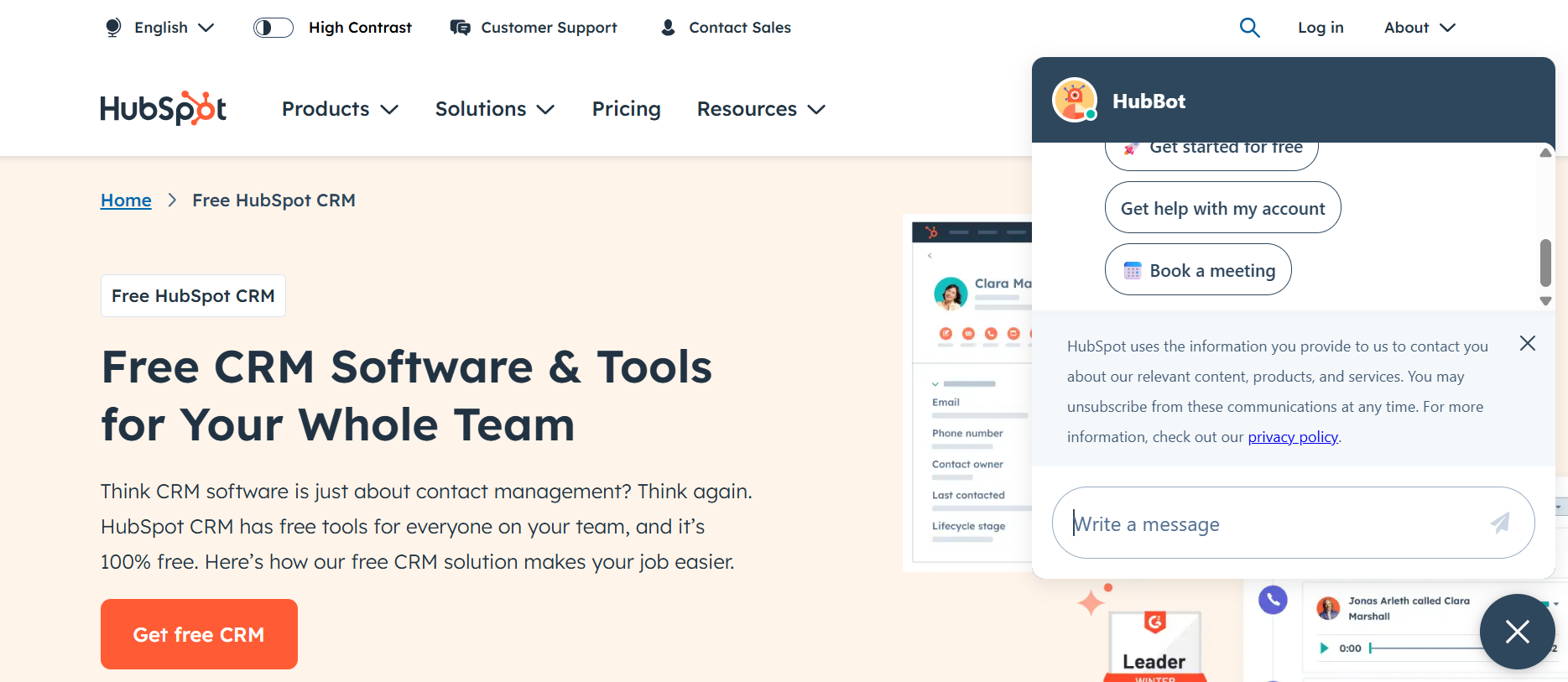
HubSpot CRM is one of the most popular and widely used CRM systems, especially favored by small to mid-sized businesses. It offers a comprehensive suite of tools that cater to marketing, sales, and customer service, all within a single platform. HubSpot CRM stands out for its user-friendly interface and robust capabilities that streamline business operations, improve communication, and enhance customer engagement.
The software is highly scalable, enabling businesses to start with its free plan and later upgrade to more advanced features as their needs grow. With a focus on automation and seamless integration with other business tools, HubSpot CRM is perfect for companies looking to grow without overcomplicating their processes. It also features extensive resources for users, making it easy to onboard and utilize all the system’s capabilities.
Key Features:
- Lead Management: Helps businesses manage leads with detailed tracking and segmentation.
- Email Tracking: Real-time email tracking allows sales teams to follow up on warm leads effectively.
- Reporting and Analytics: Comprehensive reporting tools offer insights into sales performance, marketing effectiveness, and customer interactions.
- Integrations: Seamless integrations with over 500 apps, including Google Workspace, Shopify, and more.
Benefits:
- Free to use with basic features, making it a great entry-level CRM.
- Powerful automation and workflow capabilities.
- Great customer support and extensive learning resources.
Use Case: Ideal for businesses that need an easy-to-use, cost-effective CRM solution with powerful marketing and sales tools.
2. Zoho CRM

Zoho CRM is a versatile and highly customizable CRM platform known for its affordability, scalability, and feature-rich functionality. It caters to businesses of all sizes, offering tools that streamline sales, marketing, and customer service operations. What makes Zoho CRM stand out is its ability to tailor the platform to meet the unique needs of different businesses through a wide range of customization options.
Whether you’re a small business looking for an affordable CRM or a large enterprise needing advanced features, Zoho CRM provides a solution that scales as your business grows. It integrates seamlessly with a broad range of third-party applications, providing a comprehensive ecosystem for businesses looking to centralize customer interactions and improve team productivity. The AI-powered tools in Zoho CRM further elevate its capabilities by offering predictive analytics, helping businesses make informed decisions.
Key Features:
- Sales Automation: Automates lead nurturing and follow-ups, boosting sales team productivity.
- Omni-channel Communication: Integrates with email, phone, live chat, social media, and more to provide a unified view of customer interactions.
- AI-Powered Analytics: Leverages artificial intelligence to provide predictive sales analytics and insights.
- Customization: Highly customizable interface and workflows to suit the unique needs of different businesses.
Benefits:
- Affordable pricing plans for businesses of all sizes.
- Flexible and scalable, making it ideal for both small businesses and large enterprises.
- Strong mobile support for sales teams on the go.
Use Case: Best for businesses looking for a highly customizable and cost-effective CRM solution.
3. Keap (formerly Infusionsoft)

Keap is a powerful CRM and marketing automation tool designed to simplify and automate sales processes. It is particularly known for its strong automation capabilities, which help businesses save time, reduce manual work, and improve operational efficiency. Keap integrates a wide range of sales and marketing functions, making it a comprehensive solution for small businesses, solopreneurs, and growing teams.
The platform enables users to automate customer journeys, nurture leads, and follow up with potential customers at the right moments, ensuring no opportunity is missed. Keap’s ease of use and focus on increasing sales team productivity make it a popular choice for businesses looking to scale without adding more complexity.
Key Features:
- Automation: Automates follow-up emails, sales processes, and customer journeys.
- Pipeline Management: Visual sales pipeline tools to track deals and stages effectively.
- CRM Integration: Integrates seamlessly with e-commerce, invoicing, and marketing tools.
- Customizable Templates: Offers customizable templates for emails, workflows, and more.
Benefits:
- Excellent for automating repetitive tasks.
- Strong integration capabilities with e-commerce platforms and third-party tools.
- Focused on improving sales team productivity.
Use Case: Perfect for small businesses and entrepreneurs looking for a highly automated CRM with powerful marketing tools.
4. Freshsales CRM
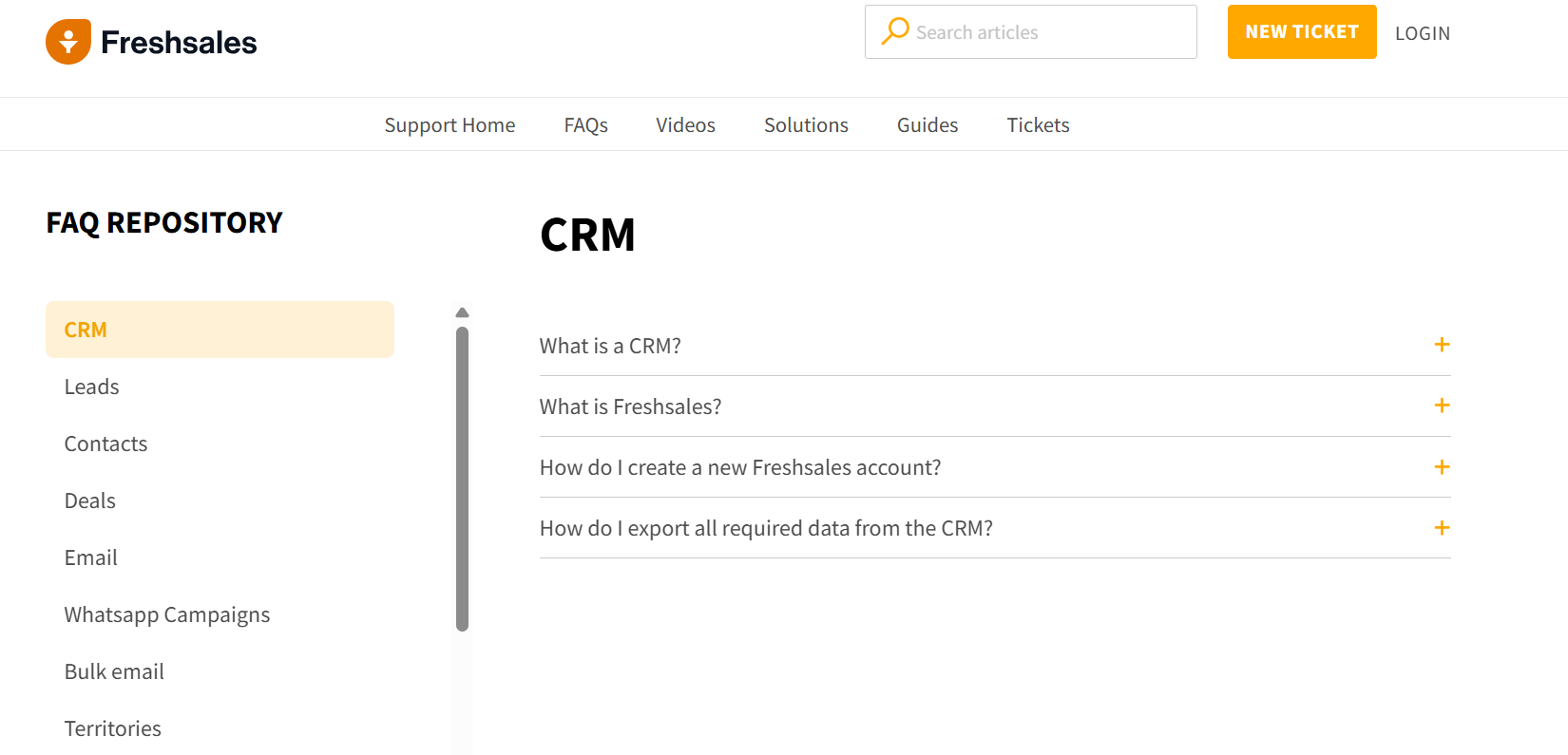
Freshsales CRM, developed by Freshworks, is known for its intuitive interface and advanced features that help sales teams manage their leads and deals effectively. Designed to provide a 360-degree view of the customer lifecycle, Freshsales CRM offers a comprehensive approach to lead management, sales pipeline tracking, and customer engagement.
The platform is particularly favored for its simplicity, making it accessible to businesses of all sizes without a steep learning curve. Freshsales focuses on empowering sales teams with powerful automation, real-time analytics, and seamless integrations with other business tools, ensuring that every sales opportunity is tracked and nurtured efficiently from lead generation to deal closure.
Key Features:
- Lead Scoring: Prioritize leads based on their likelihood to convert into paying customers.
- Sales Pipeline Management: Visual pipeline view to track sales stages easily.
- Automated Workflows: Automates tasks such as lead assignment, follow-up reminders, and email campaigns.
- Real-time Analytics: Provides deep insights into sales performance and trends.
Benefits:
- Easy to use with a minimal learning curve.
- Comprehensive mobile app for sales on the go.
- Integrates with popular business apps like Google Workspace and Slack.
Use Case: Ideal for small and medium-sized businesses looking for a simple yet powerful CRM solution.
5. Less Annoying CRM
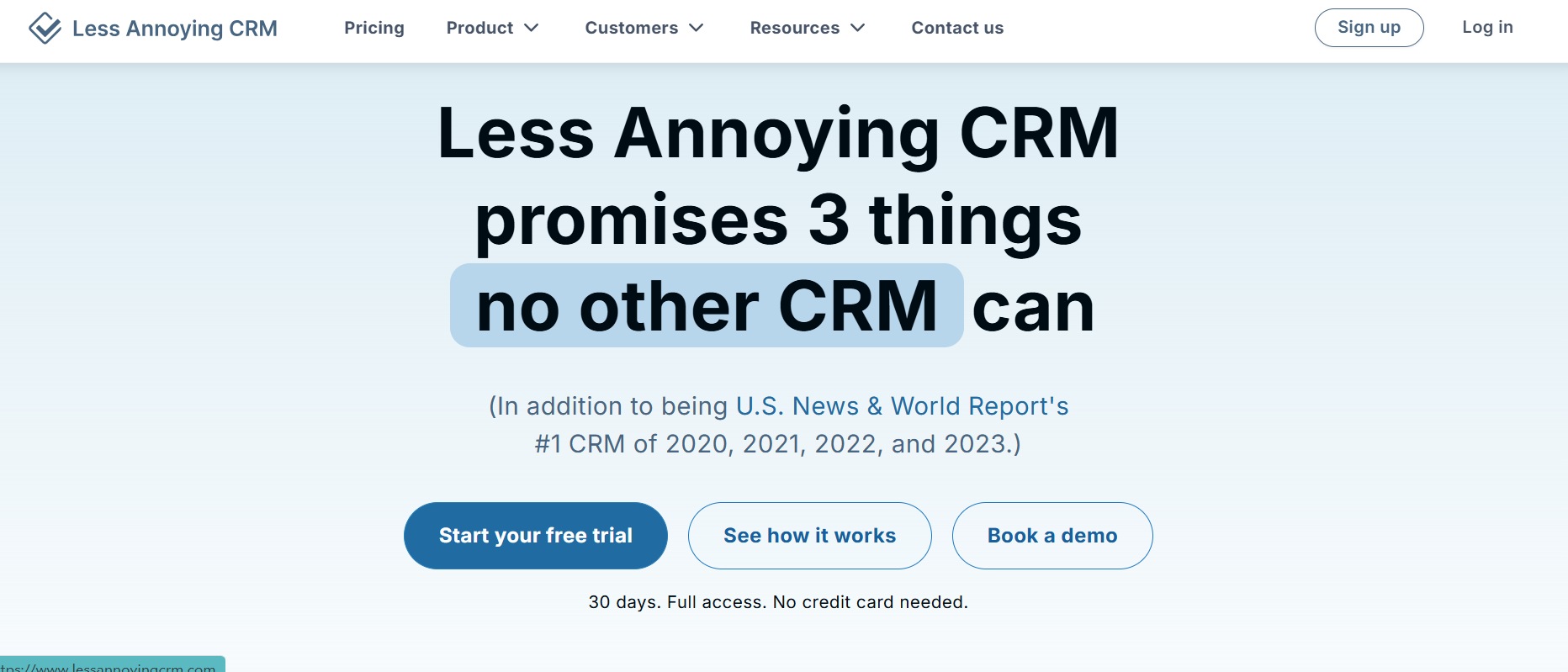
As the name suggests, Less Annoying CRM is a lightweight, easy-to-use CRM platform designed specifically for small businesses. It offers a streamlined interface that focuses on the core CRM functionalities, eliminating the complexity often found in enterprise-level tools. This CRM is known for its simplicity, making it an excellent choice for businesses that need a straightforward and efficient way to manage customer relationships without the overwhelming features of more advanced platforms.
Less Annoying CRM provides small businesses with the essential tools needed to stay organized and productive, without the added complications of unnecessary features or steep learning curves. The platform is designed with simplicity in mind, ensuring that users can start managing their contacts, tasks, and communication with minimal setup.
Key Features:
- Simple Contact Management: Easy to organize and track contacts and interactions.
- Task Management: Helps businesses keep track of important tasks and deadlines.
- Custom Fields: Customizable fields to capture the data most important to your business.
- Affordable Pricing: One of the most affordable CRM tools available.
Benefits:
- Extremely user-friendly with no unnecessary features.
- Great for small teams with limited technical expertise.
- Offers excellent customer support and easy onboarding.
Use Case: Best for small businesses or startups looking for a no-frills CRM that focuses on essential CRM features.
6. SuiteCRM

SuiteCRM is an open-source CRM software that provides businesses with maximum flexibility and customization at a lower cost compared to many proprietary CRM solutions. SuiteCRM is particularly popular among organizations that have specific requirements and need more control over their CRM environment. Unlike many traditional CRMs, SuiteCRM’s open-source nature allows businesses to tailor the platform to their exact needs, whether through custom modules, integrations, or advanced features.
It is designed to support a wide range of business processes, including sales, customer support, and marketing, making it a comprehensive and scalable solution. SuiteCRM also benefits from an active open-source community, ensuring continuous updates, support, and new features.
Key Features:
- Custom Modules: Create and customize modules tailored to your business needs.
- Advanced Reporting: Offers customizable reports and dashboards to track key performance indicators.
- Sales Automation: Automates lead management, follow-ups, and customer journeys.
- Integration with Third-Party Apps: Easily integrates with other tools and applications.
Benefits:
- Open-source nature allows for maximum customization.
- Strong community support and plenty of plugins and add-ons.
- Flexible deployment options (cloud, on-premise, or hybrid).
Use Case: Ideal for businesses looking for a highly customizable, open-source CRM solution with no vendor lock-in.
7. Salesforce

Salesforce is the world’s leading CRM platform, trusted by companies of all sizes, and is particularly favored by large enterprises. With a wide range of features that cover sales, marketing, service, and beyond, Salesforce is designed to handle the complex and varied needs of modern organizations.
The platform’s comprehensive suite of tools enables businesses to streamline operations, foster customer engagement, and make data-driven decisions. Salesforce’s flexibility and scalability make it a go-to choice for organizations looking to scale their operations, integrate with a wide range of apps, and leverage artificial intelligence for deeper customer insights. It is renowned for its strong customer support, ease of integration with third-party tools, and continuous innovation.
Key Features:
- Sales Cloud: Comprehensive tools to manage sales processes, including lead management and forecasting.
- Marketing Cloud: Powerful marketing automation tools to engage customers across all channels.
- Customer Service Tools: Robust tools to manage customer service requests, including case management and live chat.
- AI-Powered Insights: Use of artificial intelligence for predictive analytics and smarter decision-making.
Benefits:
- Highly scalable, suitable for businesses of all sizes.
- Industry-leading support and customer success tools.
- Strong integration ecosystem with thousands of third-party apps.
Use Case: Best for large businesses or enterprises requiring a comprehensive, all-in-one CRM solution.
8. Apptivo CRM
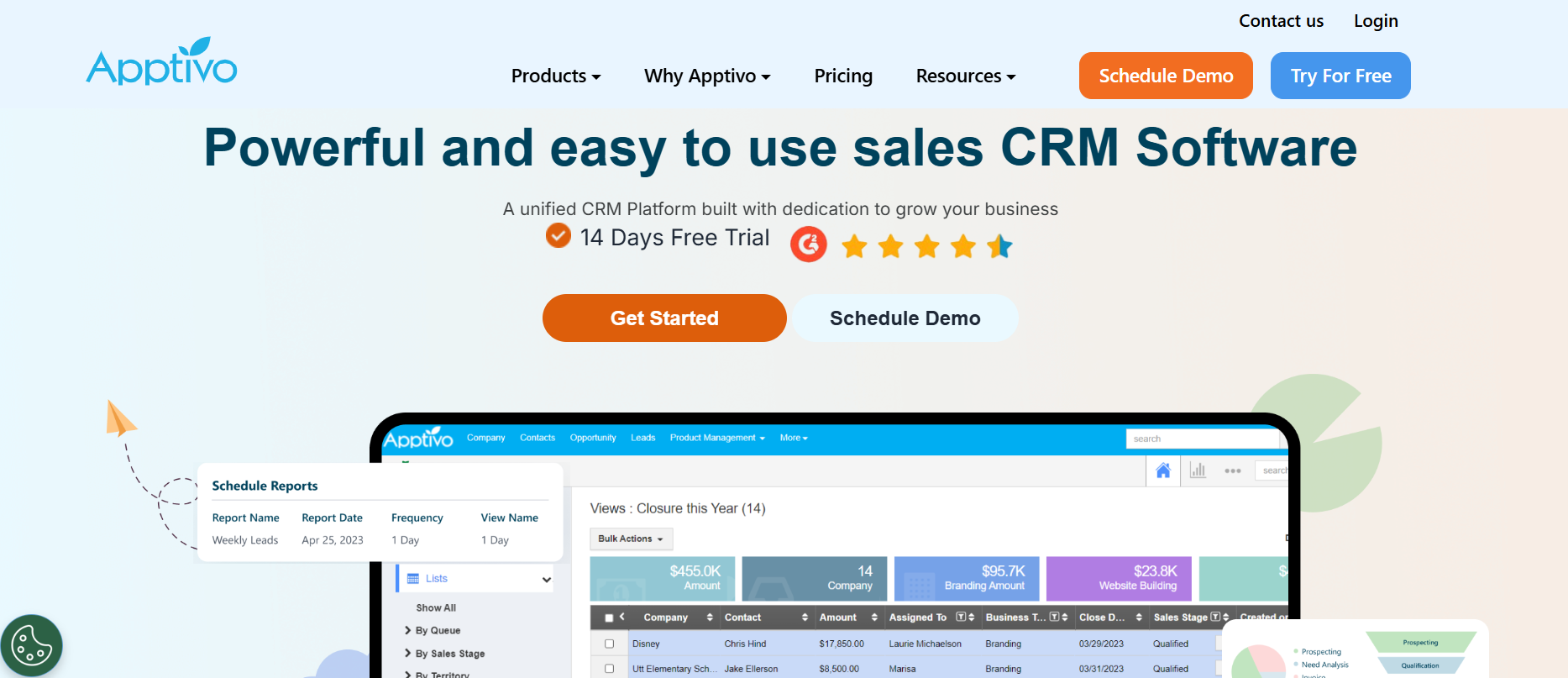
Apptivo CRM is a cloud-based CRM solution that offers a comprehensive suite of business management tools, designed to help small to medium-sized businesses streamline their operations. Known for its user-friendly design and flexible customization options, Apptivo allows businesses to manage customer relationships, sales processes, projects, and marketing efforts all within one platform.
The CRM is scalable and provides businesses with the flexibility to customize the system to suit their specific needs. Apptivo is particularly beneficial for businesses that want an affordable yet feature-rich CRM with robust automation and project management capabilities.
Key Features:
- Sales Automation: Automates repetitive sales tasks such as follow-ups, email campaigns, and lead nurturing.
- Project Management: Manage projects, tasks, and team collaboration within the same platform.
- Marketing Automation: Provides email marketing, lead generation, and customer segmentation tools.
- Customizable Dashboard: Allows users to build their own dashboards tailored to their business needs.
Benefits:
- Highly affordable with a strong range of features.
- Easy-to-use interface with minimal learning curve.
- Ideal for small to medium-sized businesses with growing needs.
Use Case: Great for businesses that need an affordable CRM with powerful automation and project management features.
9. Creatio CRM
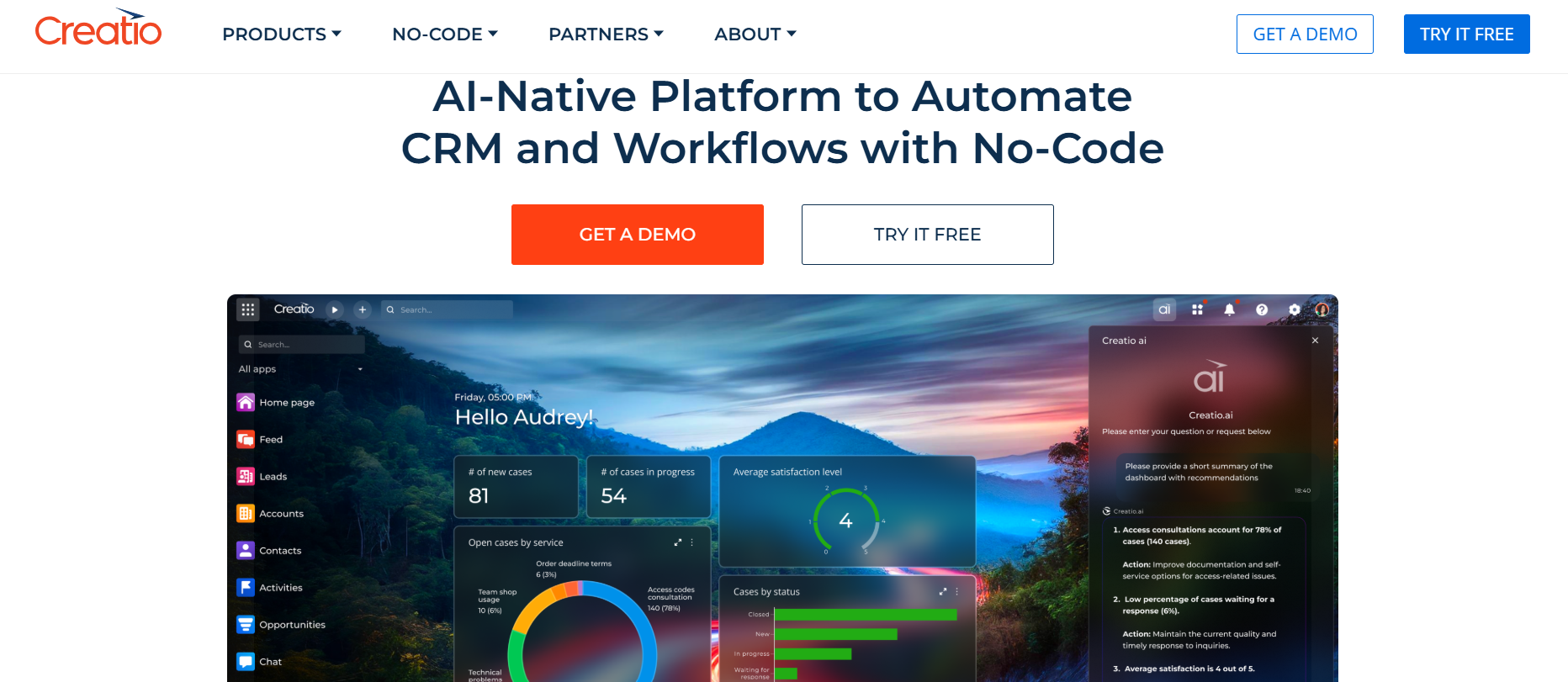
Creatio CRM offers a full suite of tools designed for sales, marketing, and customer service automation. Built with flexibility and scalability in mind, Creatio is suitable for businesses of all sizes, from small startups to large enterprises. One of its standout features is its no-code workflow automation, which empowers users to create and automate business processes without the need for technical expertise.
Creatio CRM is designed to help businesses engage customers across multiple channels, gather predictive insights using AI, and integrate seamlessly with third-party applications to create a cohesive business ecosystem. Its comprehensive functionality allows businesses to streamline operations and enhance customer experiences with minimal manual intervention.
Key Features:
- No-Code Workflow Automation: Build and automate business processes without needing any coding knowledge.
- Omni-channel Engagement: Engage customers through multiple channels including email, social media, and live chat.
- AI-Powered Analytics: Predictive analytics to help optimize sales and marketing efforts.
- Robust Integrations: Integrates with a variety of third-party applications and platforms.
Benefits:
- No-code environment makes it accessible for non-technical users.
- Flexible pricing plans for businesses of all sizes.
- Comprehensive functionality across sales, marketing, and service.
Use Case: Ideal for businesses that need a highly customizable and scalable CRM solution with strong automation capabilities.
10. Mailchimp
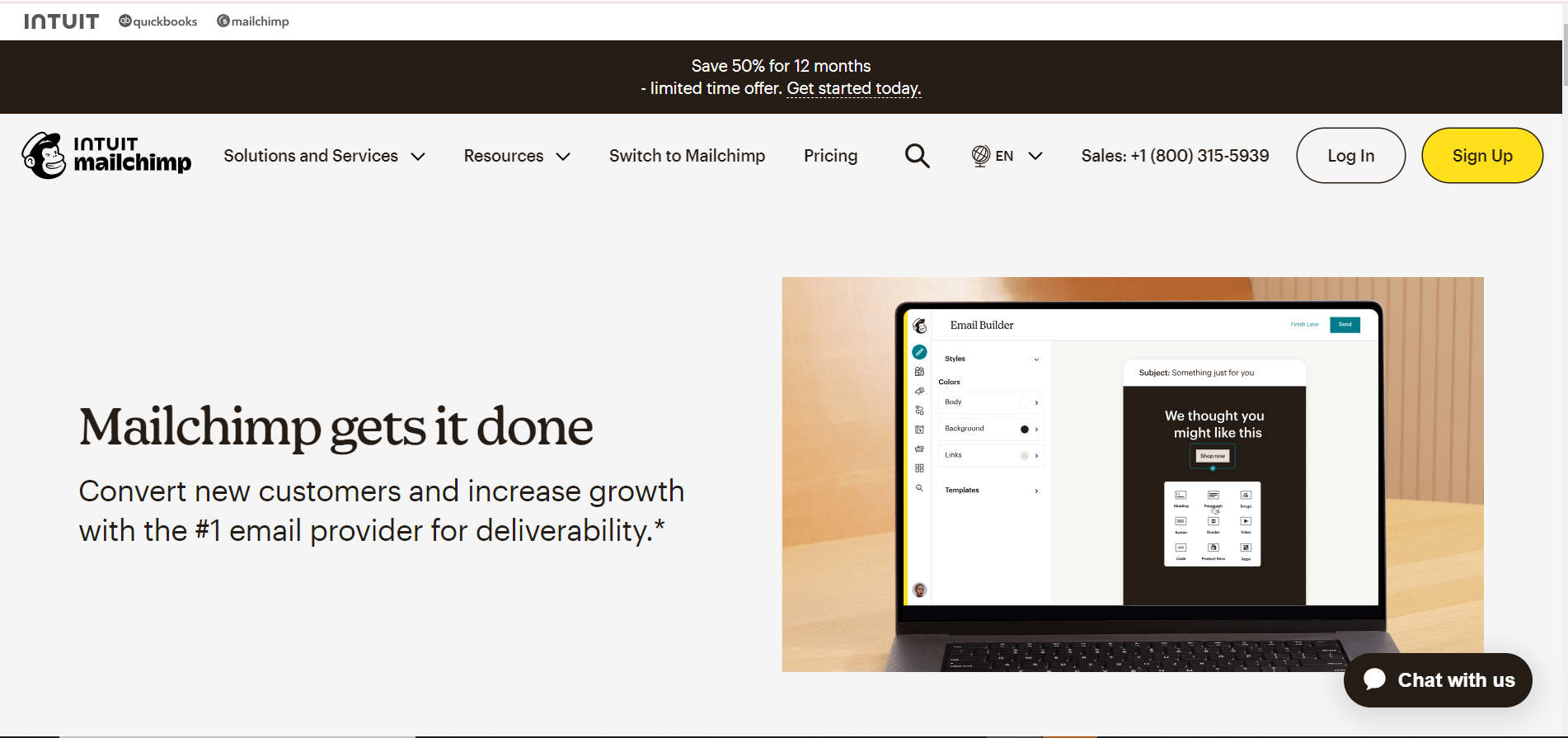
Although traditionally known for email marketing, Mailchimp has evolved into a comprehensive CRM platform that combines marketing automation, customer engagement, and sales tools within a single platform. Mailchimp is particularly well-suited for small businesses and e-commerce stores that rely heavily on email marketing but also need robust features for lead generation, customer relationship management, and workflow automation.
Its user-friendly interface makes it easy for businesses to create, execute, and track marketing campaigns while providing insights that help optimize marketing efforts. With a strong emphasis on email campaigns and customer engagement, Mailchimp has become an essential tool for businesses looking to grow their customer base and drive sales through targeted marketing.
Key Features:
- Email Campaigns: Create, send, and track email campaigns easily.
- Audience Segmentation: Segment customers based on behaviors, demographics, and other factors.
- Marketing Automation: Automate workflows, follow-ups, and customer journeys.
- Landing Pages and Forms: Build custom landing pages and sign-up forms to capture leads.
Benefits:
- Excellent for small businesses focused on email marketing and lead generation.
- Simple, intuitive interface that’s easy to navigate.
- Free plan available with essential features for small teams.
Use Case: Best for small businesses or e-commerce stores that rely heavily on email marketing and automation.
11. Dynamics 365 CRM
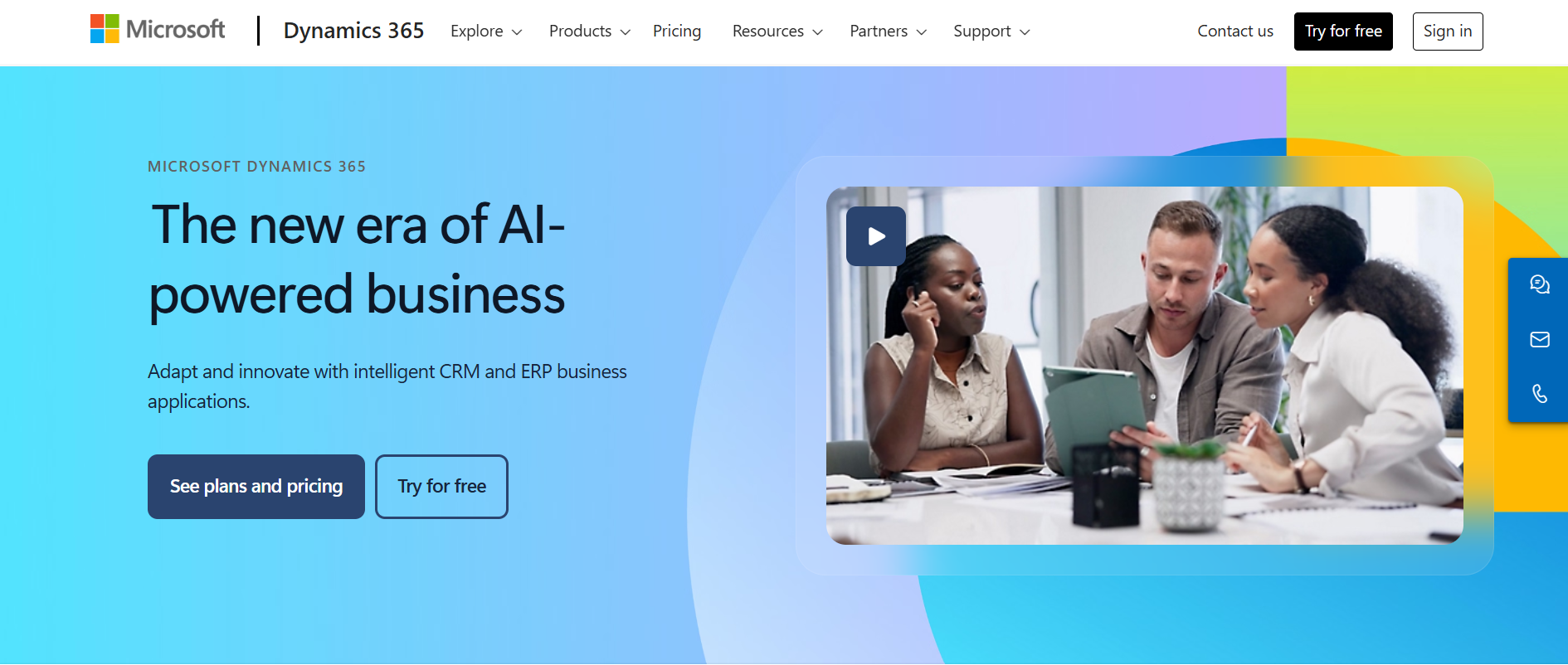
Microsoft Dynamics 365 CRM is a robust, enterprise-level CRM solution that seamlessly integrates with other Microsoft products, providing businesses with a comprehensive, unified system to manage customer relationships. Designed for large organizations, Dynamics 365 CRM offers advanced features and deep integration with existing Microsoft services such as Office 365, Microsoft Teams, and other Microsoft applications.
It is built to support complex business operations and provide businesses with powerful tools to streamline sales, marketing, and customer service processes. Through its use of artificial intelligence and advanced analytics, Dynamics 365 empowers businesses to make smarter decisions and improve customer engagement.
Key Features:
- Sales and Marketing Automation: Automate and streamline sales and marketing processes.
- Customer Insights: Gain actionable insights into customer behavior and preferences.
- Artificial Intelligence: Use AI to predict customer needs and provide personalized recommendations.
- Integration with Microsoft Products: Integrates with Office 365, Microsoft Teams, and other Microsoft applications.
Benefits:
- Ideal for businesses already using Microsoft tools and looking for deeper integration.
- Enterprise-level features for advanced reporting and data analysis.
- Scalability to handle complex business operations.
Use Case: Best for large enterprises that are already using Microsoft services and require a CRM with strong integration and enterprise capabilities.
12. ClickUp CRM

ClickUp is a versatile project management tool that has evolved to include CRM features, making it a powerful platform for businesses that need to manage both customer relationships and internal tasks in one place. It stands out for its ability to integrate project management and CRM functionalities, allowing businesses to streamline their operations and boost team productivity.
ClickUp is especially popular for its customizable interface and flexibility, allowing users to tailor workflows, tasks, and customer relationship management processes to meet their unique needs. The platform’s easy-to-use interface, combined with robust automation and reporting tools, makes it an ideal choice for businesses looking for an all-in-one solution for managing customer interactions, projects, and tasks.
Key Features:
- Custom Fields: Personalize your CRM experience with custom fields to capture relevant data.
- Task and Project Management: Manage tasks, projects, and workflows alongside customer interactions.
- Goal Tracking: Set and track sales goals and objectives to ensure targets are met.
- Automated Workflows: Automate processes such as lead assignment and follow-up emails.
Benefits:
- All-in-one platform for project management and CRM.
- Strong reporting and analytics tools for tracking progress.
- Affordable pricing with a free plan for basic use.
Use Case: Ideal for businesses that need an integrated CRM and project management tool.
13. Pipedrive CRM
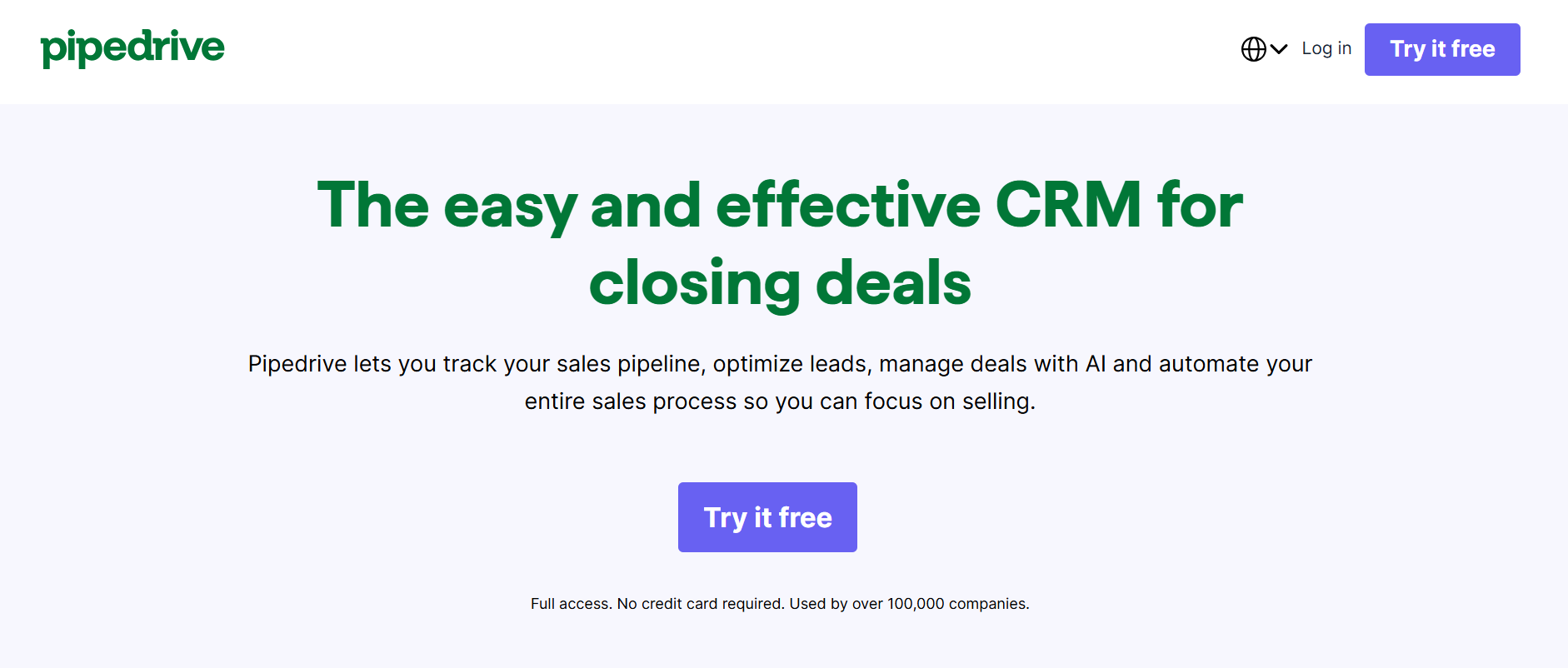
Pipedrive is a sales-focused CRM designed specifically for small businesses and startups. It offers a simple, visual interface that makes it easy to manage sales pipelines and track deals from start to finish. Pipedrive is built around the concept of helping sales teams stay organized and efficient, providing a clear view of where each lead is in the sales process.
Its user-friendly design, combined with powerful sales automation and reporting tools, allows businesses to focus on what matters most—closing deals. With strong customer support and training resources, Pipedrive is an excellent choice for small teams looking to improve their sales efficiency without complex setup or high costs.
Key Features:
- Pipeline Management: Visual sales pipelines for managing leads and deals.
- Automation: Automates repetitive sales tasks such as follow-ups and reminders.
- Email Integration: Integrates with email platforms for seamless communication tracking.
- Reporting: Provides detailed reporting on sales performance and KPIs.
Benefits:
- Intuitive and user-friendly interface.
- Focused on sales team productivity and pipeline management.
- Strong customer support and training materials.
Use Case: Best for small businesses and startups with a strong sales focus.
14. Monday.com CRM
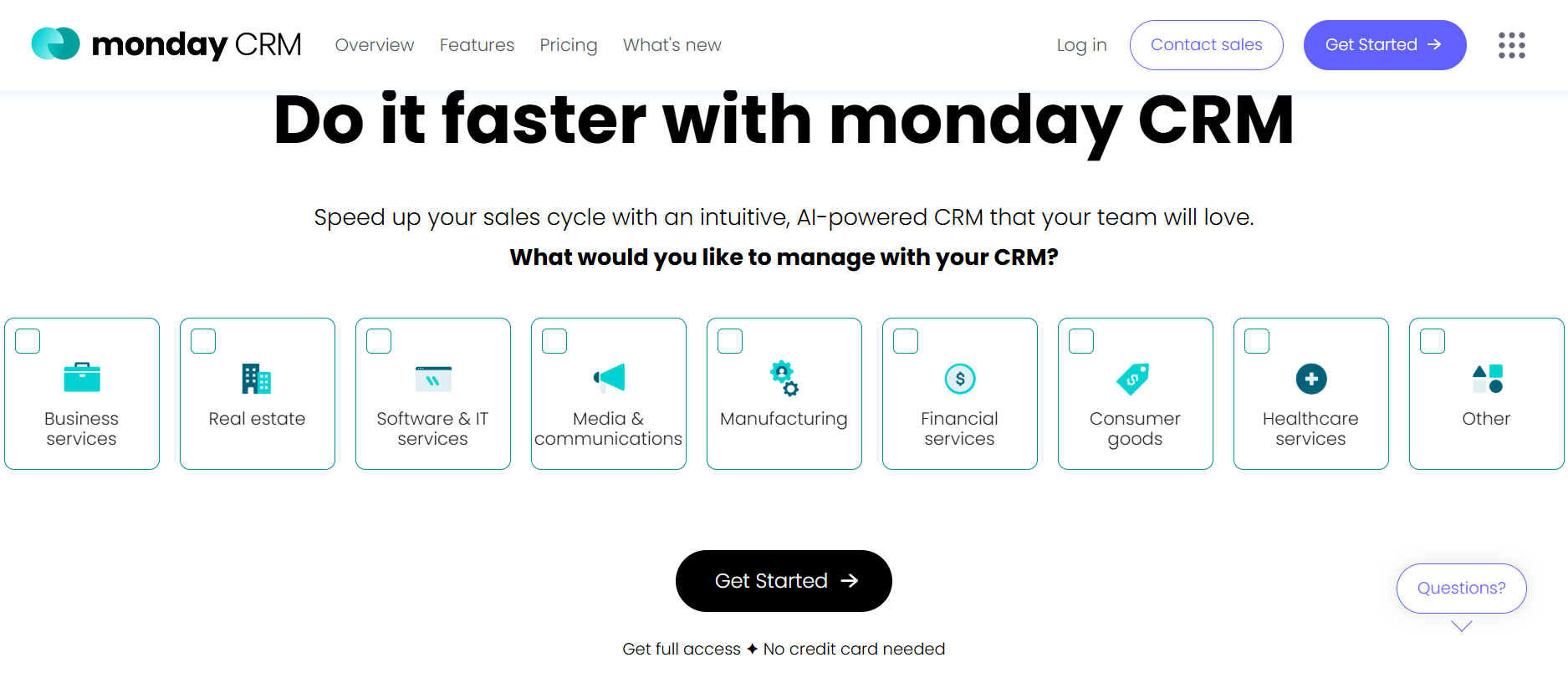
Monday.com is a flexible work operating system that integrates CRM functionalities, designed for teams that need a customizable platform to manage customer relationships alongside other business processes. Known for its versatility, Monday.com is much more than a project management tool—it’s a complete work operating system that allows businesses to build workflows, track progress, and manage customer interactions seamlessly.
With its highly visual interface, powerful automation features, and robust collaboration tools, Monday.com is perfect for teams that need to manage customer relationships while staying on top of projects and tasks. Whether you’re in sales, marketing, customer service, or operations, Monday.com offers a customizable solution to meet your needs.
Key Features:
- Custom Workflows: Build and manage custom workflows to fit your team’s needs.
- Visual Dashboards: Create visual dashboards for a clear overview of projects and CRM activities.
- Automations: Automate repetitive tasks like lead management and follow-ups.
- Integration with Third-Party Apps: Connect with a variety of other tools like Google Workspace, Slack, and more.
Benefits:
- Highly customizable to fit a variety of workflows and processes.
- Suitable for teams across various industries.
- Great collaboration features and easy-to-use interface.
Use Case: Ideal for businesses looking for a highly flexible CRM with strong project management and team collaboration features.
15. Insightly CRM
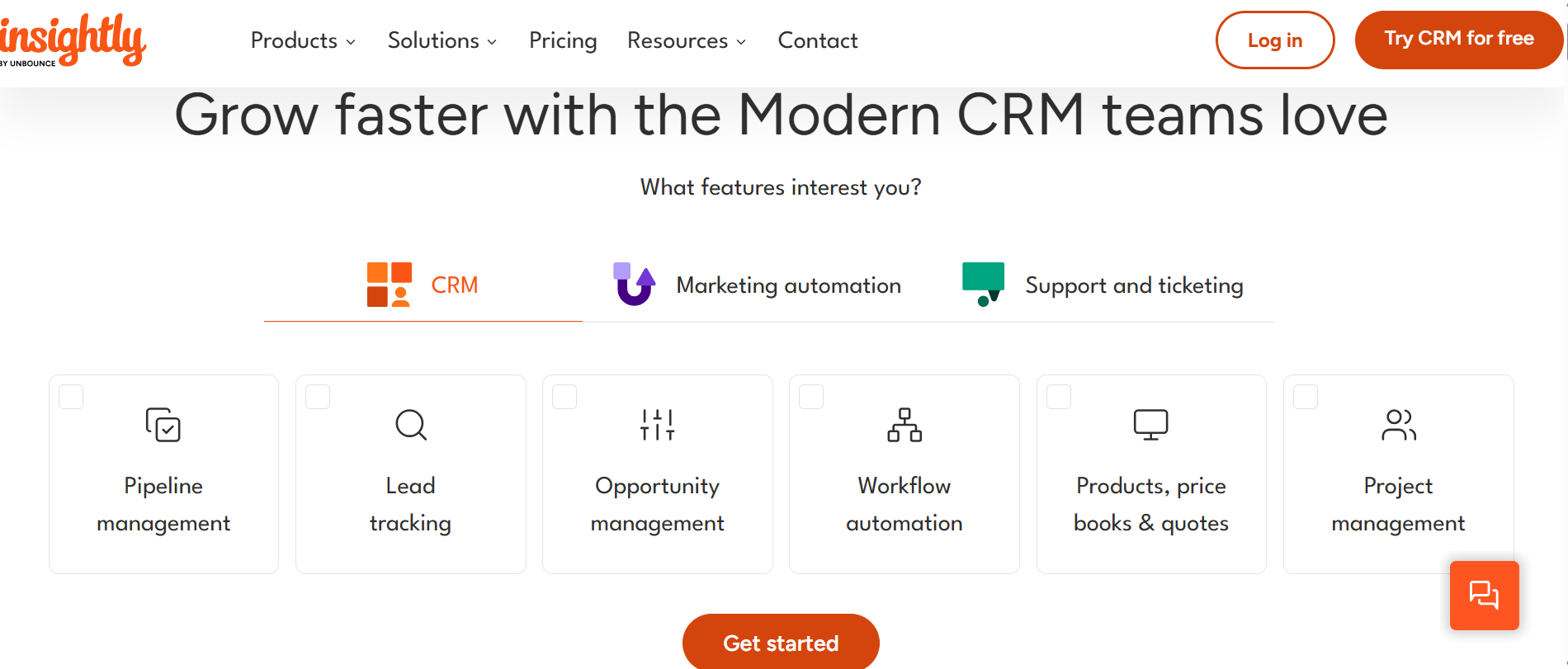
Insightly is a CRM tool specifically designed for small and medium-sized businesses, offering a comprehensive suite of features to manage sales, projects, and customer service in a unified platform.
Insightly stands out by combining traditional CRM functionalities with robust project management tools, making it an ideal solution for businesses looking to streamline customer relationship management while simultaneously managing tasks and projects. With its intuitive interface and a strong focus on collaboration and automation, Insightly is built to increase productivity and provide actionable insights to drive business growth.
Key Features:
- Project Management: Helps businesses manage projects alongside customer relationships.
- Lead Management: Track and convert leads with detailed reporting and insights.
- Task Automation: Automates workflows to save time and increase productivity.
- Mobile App: Allows users to manage relationships and projects on the go.
Benefits:
- Easy-to-use interface with strong project management capabilities.
- Affordable pricing with a range of useful features for small businesses.
- Excellent customer support.
Use Case: Best for businesses that need a CRM with integrated project management tools.
Conclusion
Choosing the right CRM software is essential for any business looking to improve its customer relationships, sales processes, and marketing strategies. The CRM solutions listed above—HubSpot, Zoho, Keap, Freshsales, Less Annoying CRM, SuiteCRM, Salesforce, Aptivo, Creatio, Mailchimp, Dynamics 365, ClickUp, Pipedrive, Monday.com, and Insightly—are among the best in 2025, each offering unique features tailored to different business needs. Whether you’re a small startup or a large enterprise, there’s a CRM solution that can help streamline your operations and improve customer engagement.
Frequently Asked Questions (FAQs)
What CRM is best for small businesses?
For small businesses, CRM systems like HubSpot CRM, Zoho CRM, and Less Annoying CRM are ideal. They are affordable, user-friendly, and offer the necessary features for small business growth.
Can I use CRM software for free?
Yes, many CRM software options offer free plans with essential features, including HubSpot CRM, Zoho CRM, and Mailchimp.
How does CRM software help sales teams?
CRM software helps sales teams by streamlining lead management, automating follow-ups, providing analytics, and ensuring that all customer interactions are tracked and visible to the team.
Which CRM is best for marketing automation?
Mailchimp, Keap, and Creatio are excellent CRM platforms for marketing automation, offering tools to automate email campaigns, lead nurturing, and customer engagement.
How much does CRM software cost?
CRM pricing varies depending on the platform and the number of users. Some CRMs, like HubSpot, offer free versions, while others, like Salesforce and Dynamics 365, have pricing that starts at $25 to $65 per user per month, with higher-tier plans for larger businesses.
